You
I know how frustrating it can get with all those assignments mate.
Nursing Being my main profession line, i have essential guides that are A graded, I am a very friendly person so don
- 4081
- 0
- 239
Community
- Followers
- Following
1491 Reviews received
4344 items

BIOS 251 Exam 1 Preparation Questions with Answers
The study of human structure - ANS: Anatomy The study of human function - ANS: Physiology A tendency for organisms to maintain a balanced or constant internal state - ANS: Homeostasis A state of balance - ANS: Equilibrium Consequences of homeostatic imbalance - ANS: Illness or death Thermoregulation Process - ANS: A feedback loop in which a system responds to a change by reversing that change, or by decreasing the rate at which the change is occurring. (Ex. thermoregulation) -...
- Exam (elaborations)
- • 31 pages •
The study of human structure - ANS: Anatomy The study of human function - ANS: Physiology A tendency for organisms to maintain a balanced or constant internal state - ANS: Homeostasis A state of balance - ANS: Equilibrium Consequences of homeostatic imbalance - ANS: Illness or death Thermoregulation Process - ANS: A feedback loop in which a system responds to a change by reversing that change, or by decreasing the rate at which the change is occurring. (Ex. thermoregulation) -...
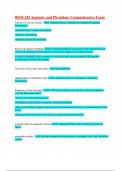
BIOS 255 Anatomy and Physiology Comprehensive Exam with Verified Answers
What does a synergistic muscle do - ANS: also called fixators, act around a joint to help the action of an agonist muscle. (iliacus, psoas major, and rectus femoris) hamstring group - ANS: biceps femoris, semitendinosus, semimembranosus sodium-potassium ion - ANS: Neuron has a negative charge at rest. Slightly positive charge sodium ions on the outside. During the firing, sodium ions rush into the axon causing depolarization. Potassium ions rush out of the axon causing it to return to i...
- Exam (elaborations)
- • 7 pages •
What does a synergistic muscle do - ANS: also called fixators, act around a joint to help the action of an agonist muscle. (iliacus, psoas major, and rectus femoris) hamstring group - ANS: biceps femoris, semitendinosus, semimembranosus sodium-potassium ion - ANS: Neuron has a negative charge at rest. Slightly positive charge sodium ions on the outside. During the firing, sodium ions rush into the axon causing depolarization. Potassium ions rush out of the axon causing it to return to i...
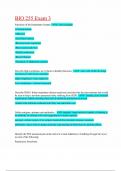
BIOS 255 Anatomy and Physiology Exam 3 updated with Verified Answers
Describe the control of the dorsal respiratory group neurons on respiration - ANS: -Modifies the rate and depth of breathing -controls the basic rhythm of breathing by triggering inspiratory impulses -neurons send impulses to the motor nerves of diaphragm and external intercostal muscles Describe the processes of exhalation and inhalation during eupnea (and identify the muscles involved). - ANS: -inspiratory neurons fire for about 2 sec, expiratory neurons fire for about 3 sec -Normal quie...
- Exam (elaborations)
- • 9 pages •
Describe the control of the dorsal respiratory group neurons on respiration - ANS: -Modifies the rate and depth of breathing -controls the basic rhythm of breathing by triggering inspiratory impulses -neurons send impulses to the motor nerves of diaphragm and external intercostal muscles Describe the processes of exhalation and inhalation during eupnea (and identify the muscles involved). - ANS: -inspiratory neurons fire for about 2 sec, expiratory neurons fire for about 3 sec -Normal quie...
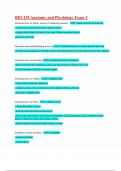
BIOS 255 Anatomy and Physiology Exam 2 Updated with Verified Answers
List and identify all the factors that are important in ensuring adequate venous return to the heart - ANS: -A strongly beating heart -An adequate arterial blood pressure -Valves in the veins -Pumping action of skeletal muscles as they contract -Changing pressures in the chest cavity caused by breathing Describe the functions of plasma proteins that remain in the blood with regards to capillary filtration - ANS: external jugular vein function - ANS: drains blood from the facial region...
- Exam (elaborations)
- • 10 pages •
List and identify all the factors that are important in ensuring adequate venous return to the heart - ANS: -A strongly beating heart -An adequate arterial blood pressure -Valves in the veins -Pumping action of skeletal muscles as they contract -Changing pressures in the chest cavity caused by breathing Describe the functions of plasma proteins that remain in the blood with regards to capillary filtration - ANS: external jugular vein function - ANS: drains blood from the facial region...
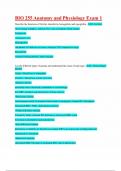
BIOS 255 Anatomy and Physiology Exam 1 updated 2024 with Verified Answers
Refractory period in the action potential of cardiac muscle cells. - ANS: -absolute refractory period of 250 ms -Prevents wave summation and tetanus which would stop the pumping action of the heart synovial fluid functions - ANS: -nourishes the articular cartilages -removes their wastes -makes movements at synovial joints almost friction-free pleural fluid function - ANS: -acts as a lubricant that enables the lungs to expand and contract with minimal friction pericardial fluid functi...
- Exam (elaborations)
- • 9 pages •
Refractory period in the action potential of cardiac muscle cells. - ANS: -absolute refractory period of 250 ms -Prevents wave summation and tetanus which would stop the pumping action of the heart synovial fluid functions - ANS: -nourishes the articular cartilages -removes their wastes -makes movements at synovial joints almost friction-free pleural fluid function - ANS: -acts as a lubricant that enables the lungs to expand and contract with minimal friction pericardial fluid functi...
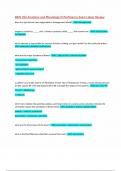
BIOS 255 Anatomy and Physiology III Proficiency Exam Latest 2024 Review
does the right atrium have oxygenated or deoxygenated blood? - ANS: deoxygenated oxygen is carried by _____ cells. It binds to proteins called _____ that contain iron. - ANS: erythrocytes; hemoglobin which element is responsible for immune function, clotting, and gas transfer? (in this particular order) - ANS: leukocytes; platelets; erythrocytes what are the major functions of blood? - ANS: - plays a role in immune function - temperature regulation - pH regulation - gas/nutrients/ w...
- Exam (elaborations)
- • 5 pages •
does the right atrium have oxygenated or deoxygenated blood? - ANS: deoxygenated oxygen is carried by _____ cells. It binds to proteins called _____ that contain iron. - ANS: erythrocytes; hemoglobin which element is responsible for immune function, clotting, and gas transfer? (in this particular order) - ANS: leukocytes; platelets; erythrocytes what are the major functions of blood? - ANS: - plays a role in immune function - temperature regulation - pH regulation - gas/nutrients/ w...
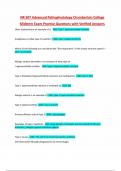
NR 507 Advanced Pathophysiology Chamberlain College Midterm Exam Practice Questions with Verified Answers
Where does the antibody bind to the antigen in type 3 response? - ANS: in blood or body fluids and then circulates to tissue Where does the antibody bind to the antigen in type 1, 2, and 4? - ANS: on cell surface Primary effector cell in type 3 - ANS: neutrophils example of type 3 reaction - ANS: serum sickness type 4 hypersensitivity reaction - ANS: cell-mediated response primary mediators of type 4 - ANS: lymphocytes and macrophages type 4 mediated by - ANS: T lymphocytes and...
- Exam (elaborations)
- • 44 pages •
Where does the antibody bind to the antigen in type 3 response? - ANS: in blood or body fluids and then circulates to tissue Where does the antibody bind to the antigen in type 1, 2, and 4? - ANS: on cell surface Primary effector cell in type 3 - ANS: neutrophils example of type 3 reaction - ANS: serum sickness type 4 hypersensitivity reaction - ANS: cell-mediated response primary mediators of type 4 - ANS: lymphocytes and macrophages type 4 mediated by - ANS: T lymphocytes and...
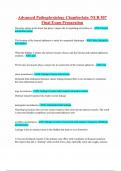
Advanced Pathophysiology NR507/NR 507 Final Exam Preparation 250+ Questions with Verified Answers
The relay station in the brain that plays a major role in regulating micturition is: - ANS: Pontine micturition center. The location of the internal sphincter is under the urogenital diaphragm. - ANS: false (located in the bladder) When the bladder is empty, the detrusor muscle relaxes, and the internal and external sphincters constrict. - ANS: true The levator ani muscle plays a major role in constriction of the external sphincter. - ANS: true stress incontinence - ANS: leakage of u...
- Exam (elaborations)
- • 34 pages •
The relay station in the brain that plays a major role in regulating micturition is: - ANS: Pontine micturition center. The location of the internal sphincter is under the urogenital diaphragm. - ANS: false (located in the bladder) When the bladder is empty, the detrusor muscle relaxes, and the internal and external sphincters constrict. - ANS: true The levator ani muscle plays a major role in constriction of the external sphincter. - ANS: true stress incontinence - ANS: leakage of u...

Advanced Pathophysiology NR 507 Final Exam Questions with Verified Answers (Already Graded A)
Which of the following is true regarding a complicated urinary tract infection? - ANS: Can be caused by a structural urinary tract disorder Which of the following is a risk factor for the development of a urinary tract infection (UTI)? - ANS: Pregnancy A symptom of a lower urinary tract infection includes: - ANS: urgency Women are at a higher risk for the development of a UTI because of having a shorter urethra. - ANS: true Which of the following can help to prevent a UTI? - ANS: Inc...
- Exam (elaborations)
- • 16 pages •
Which of the following is true regarding a complicated urinary tract infection? - ANS: Can be caused by a structural urinary tract disorder Which of the following is a risk factor for the development of a urinary tract infection (UTI)? - ANS: Pregnancy A symptom of a lower urinary tract infection includes: - ANS: urgency Women are at a higher risk for the development of a UTI because of having a shorter urethra. - ANS: true Which of the following can help to prevent a UTI? - ANS: Inc...
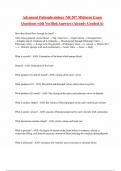
Advanced Pathophysiology NR 507 Midterm Exam Questions with Verified Answers (Already Graded A)
How does blood flow through the heart? – ANS: Deoxygenated venous blood → Sup. Vena Cava → Right Atrium →Tricuspid (AV) →Empties into R. Ventricle (& it contracts) → Blood ejected through Pulmonary Valve → Pulmonary Artery → Lungs to be Oxygenated → Pulmonary Veins → L. Atrium → Mitral (AV) → L. Ventricle (pumps with each contraction) → Aortic Valve → Aorta → Body What is systole? - ANS: Contraction of the heart which pumps blood Diastole - ANS: Relaxation o...
- Exam (elaborations)
- • 10 pages •
How does blood flow through the heart? – ANS: Deoxygenated venous blood → Sup. Vena Cava → Right Atrium →Tricuspid (AV) →Empties into R. Ventricle (& it contracts) → Blood ejected through Pulmonary Valve → Pulmonary Artery → Lungs to be Oxygenated → Pulmonary Veins → L. Atrium → Mitral (AV) → L. Ventricle (pumps with each contraction) → Aortic Valve → Aorta → Body What is systole? - ANS: Contraction of the heart which pumps blood Diastole - ANS: Relaxation o...

Electrical Level 3 Module 1 Load Calculations and Branch Feeder Circuits Quiz
Advanced health assessment: NUR 504 Quiz 4 with Correct Answers
BIBL 410 Weekly Study Questions 1 Liberty University answers complete solutions.
ATI Capstone Test Bank_Latest Fall 2021_complete.
Josephine Morrow Documentation Assignments (answered) 100% score